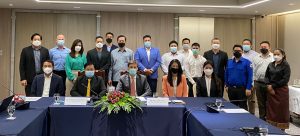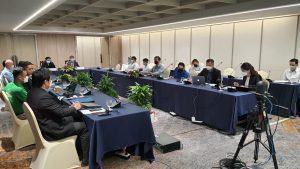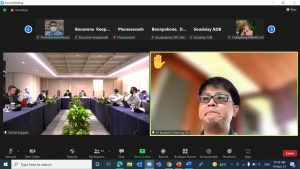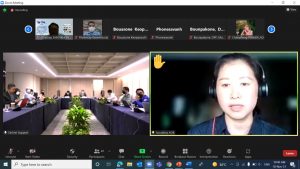 Vientiane Capital, Lao PDR, November 18, 2021. The Global Green Growth Institute (GGGI) and the Ministry of Natural Resources and Environment (MONRE) co-hosted an event to discuss the role of the private sector in addressing solid waste in Lao PDR. Organized as part of broader set of initiatives on private sector engagement in green growth and climate change, which GGGI and MONRE have been implementing since 2019, the workshop aimed to present policy frameworks as well as pilot interventions related to solid waste management, introduce the Green Climate Fund (GCF) as a potential funding source, and identify opportunities and challenges to promote the roles of private sector in this space.
Vientiane Capital, Lao PDR, November 18, 2021. The Global Green Growth Institute (GGGI) and the Ministry of Natural Resources and Environment (MONRE) co-hosted an event to discuss the role of the private sector in addressing solid waste in Lao PDR. Organized as part of broader set of initiatives on private sector engagement in green growth and climate change, which GGGI and MONRE have been implementing since 2019, the workshop aimed to present policy frameworks as well as pilot interventions related to solid waste management, introduce the Green Climate Fund (GCF) as a potential funding source, and identify opportunities and challenges to promote the roles of private sector in this space.
The workshop was chaired by Mr. Sounadeth Soukchaleun, Deputy Director General of Department of Planning and Finance (DPF) under MONRE, which is the National Designated Authority to the GCF, and co-chaired Mr. Rowan Fraser, GGGI Lao PDR Country Representative. Due to partial lockdown, the workshop was attended by 23 people for in-person attendance and 42 people joined online via Zoom. Participants came from public sector such as MONRE, Ministry of Public Works and Transport, Ministry of Industry and Commerce, and City Office of Management and Services, as well as private companies involved in waste management, and international organizations such as the World Bank, ADB, JICA, UNDP etc.
 As urbanization in Lao PDR increases, larger volumes of waste are being generated, which in turn results in increasing emissions of greenhouse gases especially methane. Methane has a higher global warming potential than carbon dioxide. Lao PDR has identified sustainable solid waste management as one of the key targets of its 2nd NDC and this presents an opportunity to engage all sectors of society to achieve this specific target. The private sector has a very important role to play in addressing solid waste issues along the waste value chain from collection to final disposal, including investing in technology and infrastructure to support sustainable solid waste management.
As urbanization in Lao PDR increases, larger volumes of waste are being generated, which in turn results in increasing emissions of greenhouse gases especially methane. Methane has a higher global warming potential than carbon dioxide. Lao PDR has identified sustainable solid waste management as one of the key targets of its 2nd NDC and this presents an opportunity to engage all sectors of society to achieve this specific target. The private sector has a very important role to play in addressing solid waste issues along the waste value chain from collection to final disposal, including investing in technology and infrastructure to support sustainable solid waste management.
 At this workshop, GGGI presented its work and pilot interventions in this sector including support to Vientiane Capital to develop its sustainable solid waste management strategy and action plan, piloting waste banks at schools, building an integrated resource recovery facility, and concept idea on large waste treatment plant which will generate refuse derived fuel or RDF to be used as an alternative energy source in cement kiln while generating organic compost from the organic matter.
At this workshop, GGGI presented its work and pilot interventions in this sector including support to Vientiane Capital to develop its sustainable solid waste management strategy and action plan, piloting waste banks at schools, building an integrated resource recovery facility, and concept idea on large waste treatment plant which will generate refuse derived fuel or RDF to be used as an alternative energy source in cement kiln while generating organic compost from the organic matter.
 The workshop was very productive. Three key intertwined elements were identified to support the role of private sector engagement in solid waste management. These include policy and regulatory solutions to provide enabling environment and policy incentives to private sector, technology solutions that are suitable to the Lao context and that can be replicated, and financing solutions that could support households to afford relevant technology such as home biogas systems, as well as support private companies to invest in large infrastructure projects. Moving forward, it is critical that coordination and partnership among different stakeholders including public sector, private sector and international development partners is built and strengthened to further explore an opportunity to tap into international climate finance, especially the GCF.
The workshop was very productive. Three key intertwined elements were identified to support the role of private sector engagement in solid waste management. These include policy and regulatory solutions to provide enabling environment and policy incentives to private sector, technology solutions that are suitable to the Lao context and that can be replicated, and financing solutions that could support households to afford relevant technology such as home biogas systems, as well as support private companies to invest in large infrastructure projects. Moving forward, it is critical that coordination and partnership among different stakeholders including public sector, private sector and international development partners is built and strengthened to further explore an opportunity to tap into international climate finance, especially the GCF.